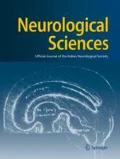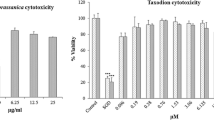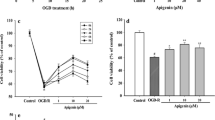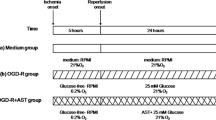Abstract
Minocycline has shown anti-inflammatory, anti-apoptotic, and antioxidative activities in many models of cerebral ischemia and human acute ischemic stroke. However, the cellular and molecular bases for its neuroprotective effects have not been fully elucidated. In this study, we investigated whether pre-treatment with minocycline could attenuate oxygen–glucose deprivation-induced PC12 cytotoxicity. The activity of matrix metalloproteinase-9 was detected by sodium dodecyl sulfate–polyacrylamide gel electrophoresis zymography. And the expressions of integrin β1, Akt and phosphorylated Akt were analyzed by Western blot. Our results showed that minocycline could ameliorate oxygen–glucose deprivation-induced PC12 cell cytotoxicity at concentrations of 20 nM–20 μM, down-regulate the production and activity of matrix metalloproteinase-9, inhibit the degradation of integrin β1, and up-regulate Akt phosphorylation at optimal concentration of 200 nM. The results may provide a new area for minocycline’s therapeutic intervention for improving the outcomes of cerebral ischemia.




Similar content being viewed by others
References
Yong VW, Wells J, Giuliani F, Casha S, Power C, Metz M (2004) The promise of minocycline in neurology. Lancet Neurol 3:744–751
Yrjanheikki J, Keinanen R, Pellikka M, Hokfelt T, Koistinaho J (1998) Tetracyclines inhibit microglial activation and are neuroprotective in global brain ischemia. Proc Natl Acad Sci USA 95:15769–15774
Yrjanheikki J, Tikka T, Keinanen R, Goldsteins G, Chan PH, Koistinaho J (1999) A tetracycline derivative, minocycline, reduces inflammation and protects against focal cerebral ischemia with a wide therapeutic window. Proc Natl Acad Sci USA 96:13496–13500
Lampl Y, Boaz M, Gilad R, Lorberboym M, Dabby R, Rapoport A, Anca-Hershkowitz M, Sadeh M (2007) Minocycline treatment in acute stroke: an open-label, evaluator-blinded study. Neurology 69:1404–1410
Fagan SC, Waller JL, Nichols FT, Edwards DJ, Pettigrew LC, Clark WM, Hall CE, Switzer JA, Ergul A, Hess DC (2010) Minocycline to improve neurologic outcome in stroke (MINOS): a dose-finding study. Stroke 41:2283–2287
Sternlicht MD, Werb Z (2001) How matrix metalloproteinases regulate cell behavior. Annu Rev Cell Dev Biol 17:463–516
Yong VW, Power C, Forsyth P, Edwards DR (2001) Metalloproteinases in biology and pathology of the nervous system. Nat Rev Neurosci 2:502–511
Lee SR, Lo EH (2004) Induction of caspase-mediated cell death by matrix metalloproteinases in cerebral endothelial cells after hypoxia-reoxygenation. J Cereb Blood Flow Metab 24:720–727
Kim GW, Kim HJ, Cho KJ, Kim HW, Cho YJ, Lee BI (2009) The role of MMP-9 in integrin-mediated hippocampal cell death after pilocarpine-induced status epilepticus. Neurobiol Dis 36:169–180
Lee JW, Juliano RL (2000) alpha5beta1 integrin protects intestinal epithelial cells from apoptosis through a phosphatidylinositol 3-kinase and protein kinase B-dependent pathway. Mol Biol Cell 11:1973–1987
Saito A, Hayashi T, Okuno S, Nishi T, Chan PH (2004) Oxidative stress affects the integrin-linked kinase signaling pathway after transient focal cerebral ischemia. Stroke 35:2560–2565
Nakajima T, Wakasa T, Okuma Y, Inanami O, Nomura Y, Kuwahara M, Kawahara K (2006) Dual inhibition of protein phosphatase-1/2a and calpain rescues nerve growth factor-differentiated PC12 cells from oxygen–glucose deprivation-induced cell death. J Neurosci Res 83:459–468
Rajput SK, Siddiqui MA, Kumar V, Meena CL, Pant AB, Jain R, Sharma SS (2011) Protective effects of L-pGlu-(2-propyl)-L-His-L-ProNH2, a newer thyrotropin releasing hormone analog in vitro and in vivo models of cerebral ischemia. Peptides 32:1225–1231
Kawakami Z, Kanno H, Ikarashi Y, Kase Y (2011) Yokukansan, a kampo medicine, protects against glutamate cytotoxicity due to oxidative stress in PC12 cells. J Ethnopharmacol 134:74–81
Zhou XQ, Zeng XN, Kong H, Sun XL (2008) Neuroprotective effects of berberine on stroke models in vitro and in vivo. Neurosci Lett 447:31–36
Miyamoto W, Min HS, Lillehoj HS (2002) Lymphocyte proliferation response during Eimeria tenella infection assessed by a new, reliable, nonradioactive colorimetric assay. Avian Dis 46:10–16
Zhang A, Zhang J, Sun P, Yao C, Su C, Sui T, Huang H, Cao X, Ge Y (2010) EIF2alpha and caspase-12 activation are involved in oxygen-glucose-serum deprivation/restoration-induced apoptosis of spinal cord astrocytes. Neurosci Lett 478:32–36
Ma X, Jiang Y, Wu A, Chen X, Pi R, Liu M, Liu Y (2010) Berberine attenuates experimental autoimmune encephalomyelitis in C57 BL/6 mice. PLoS One 5:e13489
Zhou XQ, Zeng XN, Kong H, Sun XL (2008) Neuroprotective effects of berberine on stroke models in vitro and in vivo. Neurosci Lett 447:31–36
Lee CK, Shin JI, Cho YS (2011) Protective effect of minocycline against cisplatin-induced ototoxicity. Clin Exp Otorhinolaryngol 4:77–82
Yrjänheikki J, Keinänen R, Pellikka M, Hökfelt T, Koistinaho J (1998) Tetracyclines inhibit microglial activation and are neuroprotective in global brain ischemia. Proc Natl Acad Sci USA 95:15769–15774
Morimoto N, Shimazawa M, Yamashima T, Nagai H, Hara H (2005) Minocycline inhibits oxidative stress and decreases in vitro and in vivo ischemic neuronal damage. Brain Res 1044:8–15
Song Y, Wei EQ, Zhang WP, Zhang L, Liu JR, Chen Z (2004) Minocycline protects PC12 cells from ischemic-like injury and inhibits 5-lipoxygenase activation. Neuroreport 15:2181–2184
Kikuchi K, Kawahara K, Biswas KK, Ito T, Tancharoen S, Morimoto Y, Matsuda F, Oyama Y, Takenouchi K, Miura N, Arimura N, Nawa Y, Meng X, Shrestha B, Arimura S, Iwata M, Mera K, Sameshima H, Ohno Y, Maenosono R, Yoshida Y, Tajima Y, Uchikado H, Kuramoto T, Nakayama K, Shigemori M, Hashiguchi T, Maruyama I (2009) Minocycline attenuates both OGD-induced HMGB1 release and HMGB1-induced cell death in ischemic neuronal injury in PC12 cells. Biochem Biophys Res Commun 385:132–136
Huang CL, Lee YC, Yang YC, Kuo TY, Huang NK (2012) Minocycline prevents paraquat-induced cell death through attenuating endoplasmic reticulum stress and mitochondrial dysfunction. Toxicol Lett 209:203–210
Hollborn M, Wiedemann P, Bringmann A, Kohen L (2010) Chemotactic and cytotoxic effects of minocycline on human retinal pigment epithelial cells. Invest Ophthalmol Vis Sci 51:2721–2729
Asahi M, Asahi K, Jung JC, del Zoppo GJ, Fini ME, Lo EH (2000) Role for matrix metalloproteinase 9 after focal cerebral ischemia: effects of gene knockout and enzyme inhibition with BB-94. J Cereb Blood Flow Metab 20:1681–1689
Gu Z, Kaul M, Yan B, Kridel SJ, Cui J, Strongin A, Smith JW, Liddington RC, Lipton SA (2002) S-nitrosylation of matrix metalloproteinases: signaling pathway to neuronal cell death. Science 297:1186–1190
Magnoni S, Baker A, George SJ, Duncan WC, Kerr LE, McCulloch J, Horsburgh K (2004) Differential alterations in the expression and activity of matrix metalloproteinases 2 and 9 after transient cerebral ischemia in mice. Neurobiol Dis 17:188–197
Machado LS, Anna Kozak, Ergul A, Hess DC, Borlongan CV, Fagan SC (2006) Delayed minocycline inhibits ischemia-activated matrix metalloproteinases 2 and 9 after experimental stroke. BMC Neurosci 7:1–7
Bouchard V, Demers MJ, Thibodeau S, Laquerre V, Fujita N, Tsuruo T, Beaulieu JF, Gauthier R, Vezina A, Villeneuve L, Vachon PH (2007) Fak/Src signaling in human intestinal epithelial cell survival and anoikis: differentiation state-specific uncoupling with the PI3-K/Akt-1 and MEK/Erk pathways. J Cell Physiol 212:717–728
Pankov R, Cukierman E, Clark K, Matsumoto K, Hahn C, Poulin B, Yamada KM (2003) Specific beta1 integrin site selectively regulates Akt/protein kinase B signaling via local activation of protein phosphatase 2A. J Biol Chem 278:18671–18681
Burgering BM, Coffer PJ (1995) Protein kinase B (c-Akt) in phosphatidylinositol-3-OH kinase signal transduction. Nature 376:599–602
Kaya D, Gursoy-Ozdemir Y, Yemisci M, Tuncer N, Aktan S, Dalkara T (2005) VEGF protects brain against focal ischemia without increasing blood—brain permeability when administered intracerebroventricularly. J Cereb Blood Flow Metab 25:1111–1118
Zhao H, Sapolsky RM, Steinberg GK (2006) Phosphoinositide-3-kinase/Akt survival signal pathways are implicated in neuronal survival after stroke. Mol Neurobiol 34:249–269
Franke TF (2008) PI3k/Akt: getting it right matters. Oncogene 27:6473–6488
Acknowledgments
This work was supported by grants (to X Chen) from the National Natural Science Foundation of China (81071068).
Author information
Authors and Affiliations
Corresponding author
Additional information
X. Chen and S. Chen contributed equally to this work.
Rights and permissions
About this article
Cite this article
Chen, X., Chen, S., Jiang, Y. et al. Minocycline reduces oxygen–glucose deprivation-induced PC12 cell cytotoxicity via matrix metalloproteinase-9, integrin β1 and phosphorylated Akt modulation. Neurol Sci 34, 1391–1396 (2013). https://doi.org/10.1007/s10072-012-1246-z
Received:
Accepted:
Published:
Issue Date:
DOI: https://doi.org/10.1007/s10072-012-1246-z




